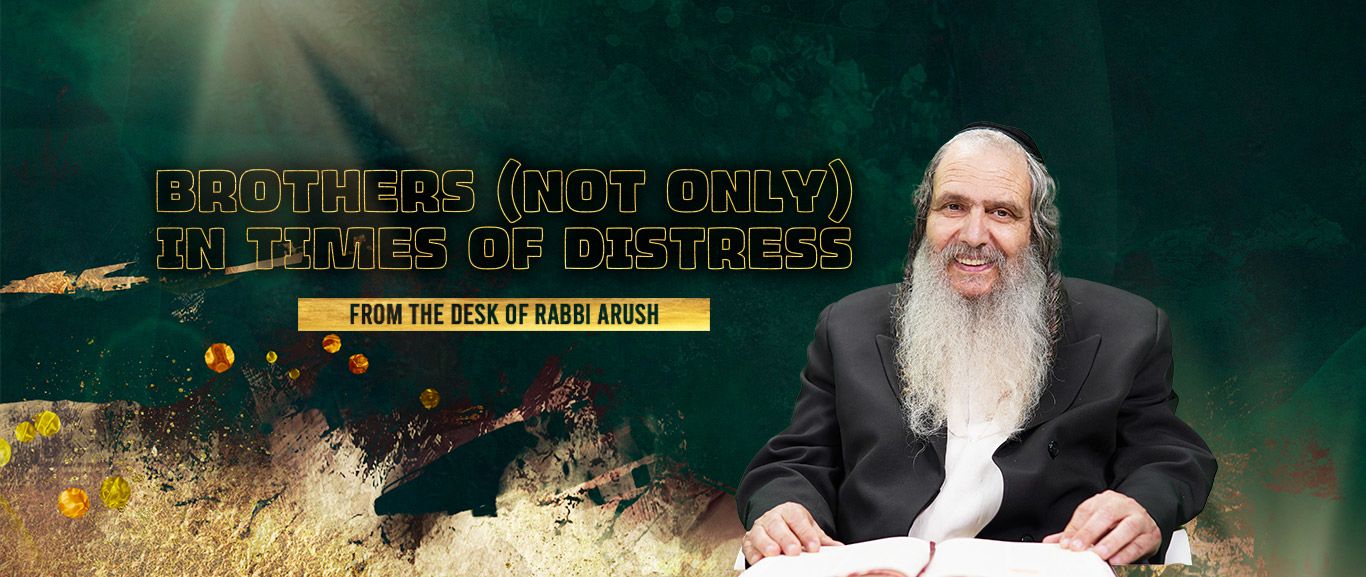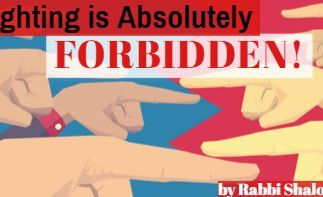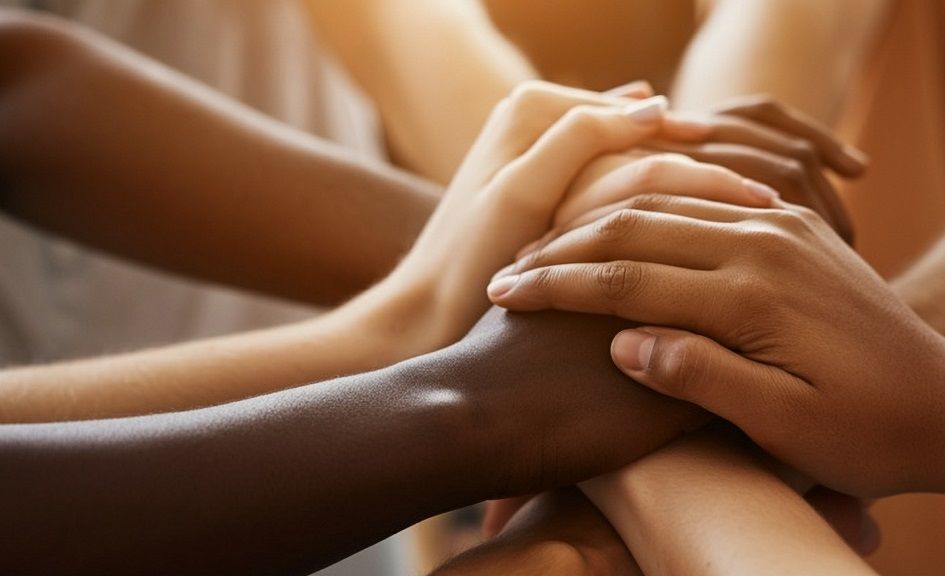
Brothers (Not Only) in Times of Distress
Often, what unites us is tragedy or some communal difficulty. The main way of showing love and building love during those times is praying for each one of our people!

It Was All Worth It
“Erez”, said Alon to his brother, “you know what my family and I are going through. You have no idea how much I’m suffering. But I must tell you that it was all worth it for me, to discover that I have a brother like you…”
The relationship between brothers is very complex. Erez and Alon were the type of brothers who would cause everyone to wonder before family gatherings whether something unpleasant would happen between them at the gathering. The rivalry between them started already in childhood. They couldn’t agree on anything, and their fights were a regular thing at home. The parents hoped that they would grow up and mature, and then this state of affairs would disappear, or at least become more moderate, but that is not what happened. They did not hate each other and they were not enemies, Baruch Hashem, but there was a constant, inexplicable tension between them.
And like in all stories, this was true “until…” Until what? Until Alon was diagnosed with cancer.
Even before the family began to digest the fact of the heavy blow, Erez found himself at the center of the action. He cared for Alon’s family as if it were his own, and he also researched the medical issues in depth and used all his contacts and abilities to help. Whatever he bought his own children, he bought his brother’s children as well; and he spent whole nights with his brother in the hospital.
It was during one of those nights that Alon told him it was worth going through all that just to discover the wonderful brotherhood between them, and both of them burst into tears…
Supernatural Love
It says, “A brother for trouble is born”. At times of trouble, one discovers the true love and brotherhood. Only then, unfortunately, do people receive the ability to rise above all the petty arguments and disagreements and unite. It is very easy to see this at times of war, may we not know from it, here in the Holy Land. There are many bad things in human nature. The foolish person says, “It is human nature, and there’s nothing to do about it.” But the wise person says, “It is human nature – what should I do in order to rise above it?” Human nature is that in troubled times it is easy to feel one’s love to one’s brother and express it. But it certainly is not supposed to be like that.
Man was created to rise above human nature and love his brother and his fellow not only in times of distress – which is “the way of the world” and which demands less effort in terms of correcting one’s middot (character traits); rather, one should correct one’s middot and develop one’s love of friends and brothers, which means the entire Jewish people, during normal times and times of joy as well, and when everything is going well, too. It requires work and effort. It means rising above one’s nature!
Moreover, the more we will manage to unite and strengthen our love of fellow Jews during good times, so we will prevent the troubles and the suffering. Because the Creator wants to see us united; when he sees we are not united under good conditions, he is, so to speak, forced to bring upon us things that are not so good, chalila, so that we will unite, and then He gets great joy from the unity, but also feels great distress that this unity is due to pain and suffering.
But when we are united during good times, Hashem has double and triple joy: One, that we are united; another, that He can grant us His chessed, loving kindness; and the third, that it is love that comes from working on oneself and doing Hashem’s will, and not because of plain human nature.
True Love of Friends
But even if not everyone manages to rise above himself during the good and calm times, during the troubled times he must do so. Because the main manifestation of brotherhood and love is during difficult times. Those are the times when it is human nature to love. And if during those times a person hardens his heart and does not awaken his love of Jews, he, chalila, shows in his heart that he is completely disconnected from the Jewish people.
Therefore, says the Yismach Yisrael – who was one of the greatest Rebbes in Poland, and his book is one of the basic books of chassidut – that in troubled times every Jew must increase his prayers for his fellow Jews, and say them with even greater fervor. Because the main manifestation of love in troubled times is praying for one’s fellow. From this we learn that anyone who wishes to strengthen his love of Jews during good times, should do so by always praying for the Jewish People.
The Yismach Yisrael goes on to say that when a person needs salvation for himself, and he negates himself and his desires and prays for his fellow Jew who needs that same salvation – that is true brotherly love. And it is so important in Heaven, that it is promised that he who prays for his fellow will be answered first.
The Yismach Yisrael then adds that requests on behalf of a fellow Jew, even material requests, are called spiritual requests, and not material. And therefore, even though it is not proper to ask for material needs on Rosh Hashanah, one is permitted and even should ask for the fulfillment of his fellow’s needs on Rosh Hashanah, and even more so, the needs of all Jews.
This is also the Creator’s demand from us. It is our obligation according to the truth and Torah morality. But it is also the best segula for annulling any troublesome decree.
Goes With the Times
The truth is, that one does not need to look for an excuse to talk about loving other Jews. Loving other Jews is the entire Torah, and is relevant on any Shabbat and any holiday or festival, but on this Shabbat in particular it seems that it is doubly, even triply connected to the parashah.
In this parashah we have the first mention of the Counting of the Omer, days during which we are in mourning over the immense talmidei chachamim (Torah scholars) who were uprooted from the world only because of a slight fault – according to their high level – in honoring their colleagues. And we go into mourning to awaken ourselves and correct this and increase love and affection among us.
In addition, our parashah deals with many mitzvot relating to interpersonal relations, especially the major mitzvah of “You shall love your fellow as yourself,” which is an amazing and astounding commandment – to love each Jew exactly like we love ourselves, and this is a great rule, with the entire Torah being a commentary on it, and the way to achieve it.
In addition, we are very close to Lag B’Omer, and we are marking a year to the calamity in Meron, in which Hashem awakened us in the most painful way to increase our ahavat Yisrael.
Love Cleanses
Therefore, we will bring here a wonderful explanation from the Yismach Yisrael on the passuk: “You shall love your fellow like yourself, I am Hashem,” which explains in the name of the Chozeh of Lublin: The reason it is hard to love one’s fellow is because one sees his faults, and therefore the way to achieve true ahavat Yisrael is to be humble – and recognize one’s own faults.
That is the interpretation of the pasuk “you shall love your fellow” despite his faults. How will you be able to do so? By “…like yourself, I am Hashem.” In other words, just like you have faults and Hashem loves you despite them, you should observe the mitzvah of following in His ways, and love your friend despite his faults.
We will end this off with the wonderful things that a person merits if he loves his fellow Jew, also from the writings of the Yismach Yisrael: By way of ahavat Yisrael – love of other Jews – even if a person has not managed to repent completely, still, his ahavat Yisrael protects him and all his heavenly accusers are silenced.
By way of ahavat Yisrael a person is cleansed of his impurities and wrong desires and bad thoughts, through the halachic rule which says that “Tumah (impurity) is negated in public”. In other words, although ordinarily it is forbidden to bring a korban, an offering, and eat it when one is tameh – impure, when the entire Jewish People is impure, they may bring korban Pesach and eat it. the Yismach Yisrael learns from this that even sources of tumah whose tumah is severe, to the point that immersing in a mikvah does no good, joining the Jewish People through love negates these sources of tumah, removing them from the individual!
Ahavat Yisrael can counteract any evil eye and any curse, as the Cohanim bless: “To bless His people Israel with love.” Whoever has ahavat Yisrael is blessed, and no curse or evil eye can harm him.
May Hashem merit us to strengthen our true ahavat Yisrael and to always pray for the Jewish People out of joy and peace, and not out of troubles and suffering. And in this merit, may we merit the complete redemption soon.







5/26/2022
Yes, you’ve got a good point. The “lack of cohesion” isn’t just the physical distance. Worse is when the distance is emotional.
I think that this is exactly what Rabbi Arush is trying to address, especially after the Meron disaster last year. The only real way out of our morass is to start looking at others in a more brotherly way. We have to change ourselves. At this point, it’s like climbing a glass wall because the divisiveness is so apparent.
5/22/2022
A real difficulty for us in the Diaspora is finding meaningful associations with other Jews. Because of the endless divisions between our people many of us are alone even in places with synagogues. In our case, we meet together online, but the lack of Jewish cohesion is heartbreaking. Suggestions?